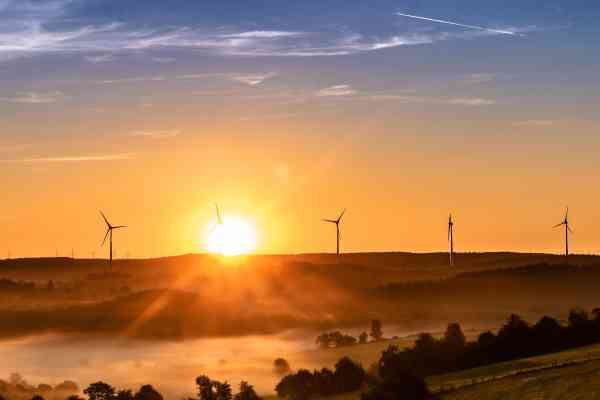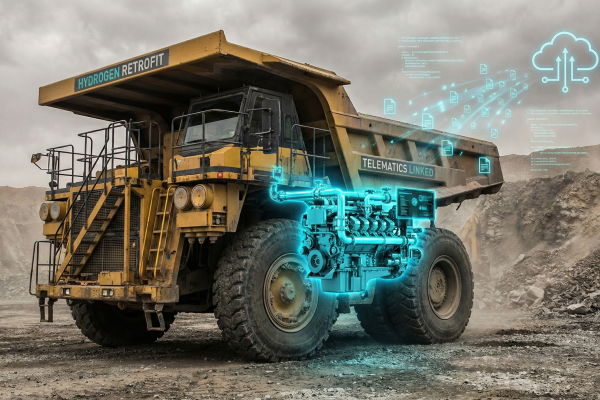August 10th, 2020 | 06:01 CEST
dynaCERT, NEL ASA, McPhy - does hydrogen need nuclear power?
In Europe, hydrogen as an energy carrier is becoming the focus of debate, offering a more environmentally friendly and practicable alternative to the battery as an energy storage medium in mobility. The production of batteries is an environmental sin par excellence. Raw materials have to be mined at great expense, a great amount of additional energy is needed for production, and at the end of the life cycle there is non-recyclable hazardous waste. Hydrogen, on the other hand, can be produced by electrolysis with CO2-neutral electricity and converted back into electricity. While in France the clean transformation of mobility can be mastered, Germany is in a self-inflicted and expensive dead-end road.
time to read: 3 minutes
|
Author:
Mario Hose
ISIN:
CA26780A1084 , NO0010081235 , FR0011742329
Table of contents:

"[...] dynaCERT's HydraGEN™ device offers a retrofit solution for diesel engines designed to protect the environment while providing economic benefits. [...]" Bernd Krueper, President & Director, dynaCERT Inc.
Author
Mario Hose
Born and raised in Hannover, Lower Saxony follows social and economic developments around the globe. As a passionate entrepreneur and columnist he explains and compares the most diverse business models as well as markets for interested stock traders.
Tag cloud
Shares cloud
Environmental bonus alleviates disadvantages
The term 'carbon-neutral energy' is often used, but strictly speaking it only refers to the moment of production of electricity. This is because the extraction of rare earths for wind turbines, materials for solar energy systems and the mining of uranium causes carbon dioxide, as does the subsequent disposal.
Electricity from coal and gas power plants is considered to be non-carbon-neutral electricity. Against the background that the EU and the German government are subsidizing electromobility, it is questionable why customers do not buy the technology without government support. Battery cars must therefore have disadvantages compared to the previous cars with combustion engines.
Sympathy versus supply responsibility?
The biggest challenge for policymakers is how to deal with past mistakes and future choices. In October 2010, Chancellor Angela Merkel and her government agreed to extend the operating lifetime of nuclear power plants, thus overturning the decision of the previous red-green coalition.
Less than six months later, in the wake of a nuclear accident in Japan, 9,000 kilometers away, Chancellor Merkel changed her mind in the light of poll results and initiated the shutdown of all German nuclear power plants by 2022. An emotional and expensive decision that will present Germany with major challenges in the future.
France at an advantage
While in France 71% of the energy mix is nuclear energy, the share of renewable energies is only 11%. In Germany, the share of renewable energies is already 46%, but the share of nuclear energy is only 13.8% and after 2022 this adjustable source of electricity is to be eliminated. The German energy supply is facing a big problem.
The additional demand for electricity for charging batteries and for the production of hydrogen inevitably leads to an increase in the adjustable production of energy from fossil fuels such as coal. In June 2020, the Kiel Institute for the World Economy published a study according to which a battery car in Germany causes an average of 300g CO2 per kilometer and a modern diesel engine is much cleaner and more environmentally friendly with 173g CO2 per kilometer.
Where will energy for hydrogen come from?
Whether the number of solar plants and wind turbines can be more than doubled in the coming years is questionable. The wind industry is already struggling with the disposal of many thousands of rotor blades, from which not much can be gained except for a granulate with which, for example, plastic park benches can be produced - but how many park benches can we use?
The manufacturers of hydrogen plants and filling stations, such as NEL ASA from Norway and McPhy from France, are nevertheless currently profiting from the political development that hydrogen is set to become an important energy carrier in Europe. The answer to the question of where the electricity for carbon-neutral hydrogen will come from is probably somewhere in the future. However, it is questionable whether a new German federal government in 2021 will dare to extend the operating life of nuclear power plants. In politics, popularity goes before logic and as long as the electricity comes out of the socket, everything is great.
Hydrogen as a catalyst for diesel engines
The following innovation is interesting in this context. dynaCERT from Canada has developed a hydrogen technology that uses the energy carrier as a catalyst and adds it to the diesel engine during combustion via the air supply. The hydrogen is produced as required in the on-board unit and increases the efficiency of the engine during combustion. As a result, according to the company, fuel consumption is reduced by up to 19% and CO2 emissions are cut by up to 10%.
It has also been measured that NOx emissions have been reduced by up to 88% and particulate matter emissions have fallen by up to 55%. This innovation from dynaCERT is called HydraGEN and is available for retrofitting. A solution that makes existing diesel vehicles and generators cleaner while conserving resources. Whether there will ever be government subsidies for such a truly environmentally friendly innovation? It remains exciting.
Conflict of interest
Pursuant to §85 of the German Securities Trading Act (WpHG), we point out that Apaton Finance GmbH as well as partners, authors or employees of Apaton Finance GmbH (hereinafter referred to as "Relevant Persons") may in the future hold shares or other financial instruments of the mentioned companies or will bet on rising or falling on rising or falling prices and therefore a conflict of interest may arise in the future. conflict of interest may arise in the future. The Relevant Persons reserve the shares or other financial instruments of the company at any time (hereinafter referred to as the company at any time (hereinafter referred to as a "Transaction"). "Transaction"). Transactions may under certain circumstances influence the respective price of the shares or other financial instruments of the of the Company.
Furthermore, Apaton Finance GmbH reserves the right to enter into future relationships with the company or with third parties in relation to reports on the company. with regard to reports on the company, which are published within the scope of the Apaton Finance GmbH as well as in the social media, on partner sites or in e-mails, on partner sites or in e-mails. The above references to existing conflicts of interest apply apply to all types and forms of publication used by Apaton Finance GmbH uses for publications on companies.
Risk notice
Apaton Finance GmbH offers editors, agencies and companies the opportunity to publish commentaries, interviews, summaries, news and etc. on news.financial. These contents serve information for readers and does not constitute a call to action or recommendations, neither explicitly nor implicitly. implicitly, they are to be understood as an assurance of possible price be understood. The contents do not replace individual professional investment advice and do not constitute an offer to sell the share(s) offer to sell the share(s) or other financial instrument(s) in question, nor is it an nor an invitation to buy or sell such.
The content is expressly not a financial analysis, but rather financial analysis, but rather journalistic or advertising texts. Readers or users who make investment decisions or carry out transactions on the basis decisions or transactions on the basis of the information provided here act completely at their own risk. There is no contractual relationship between between Apaton Finance GmbH and its readers or the users of its offers. users of its offers, as our information only refers to the company and not to the company, but not to the investment decision of the reader or user. or user.
The acquisition of financial instruments entails high risks that can lead to the total loss of the capital invested. The information published by Apaton Finance GmbH and its authors are based on careful research on careful research, nevertheless no liability for financial losses financial losses or a content guarantee for topicality, correctness, adequacy and completeness of the contents offered here. contents offered here. Please also note our Terms of use.




